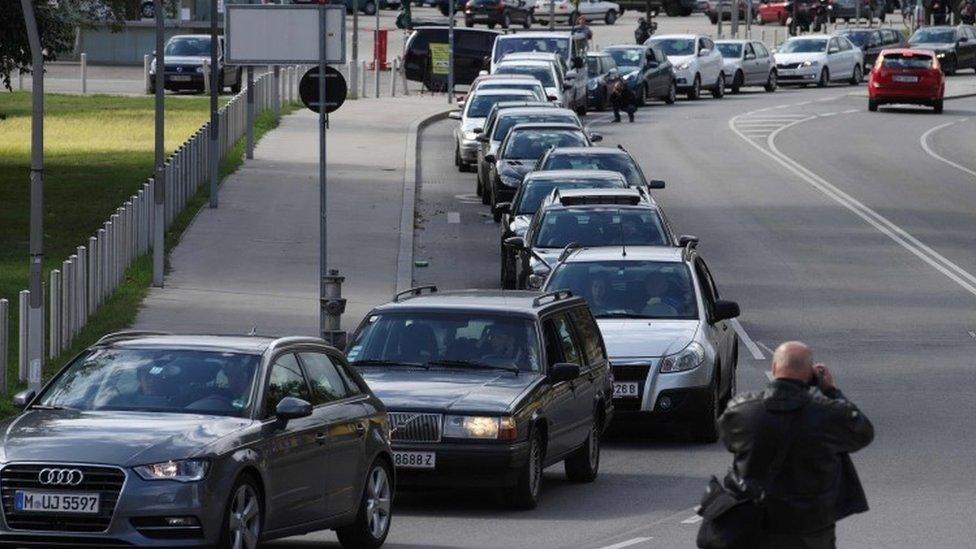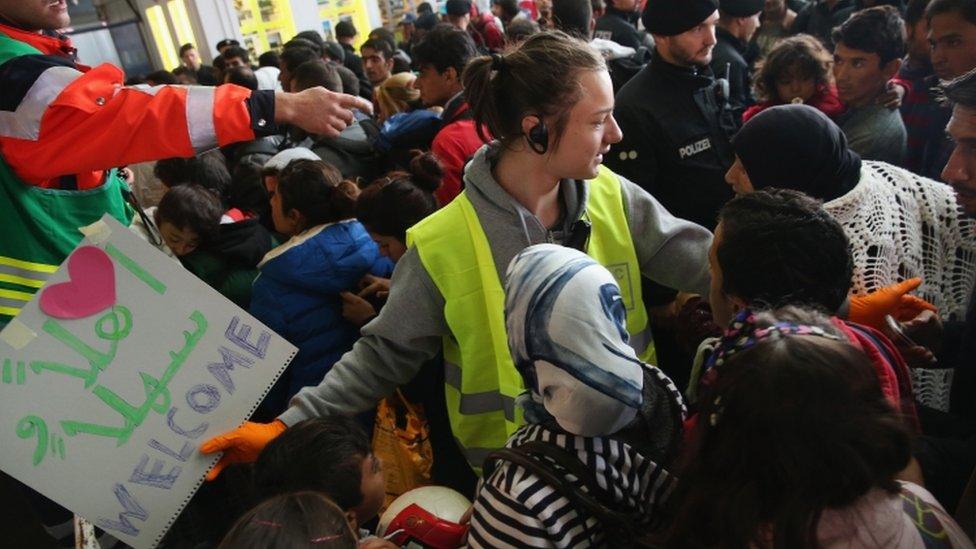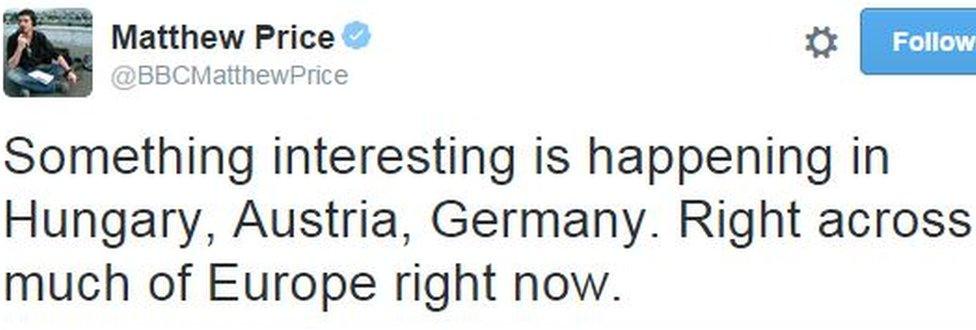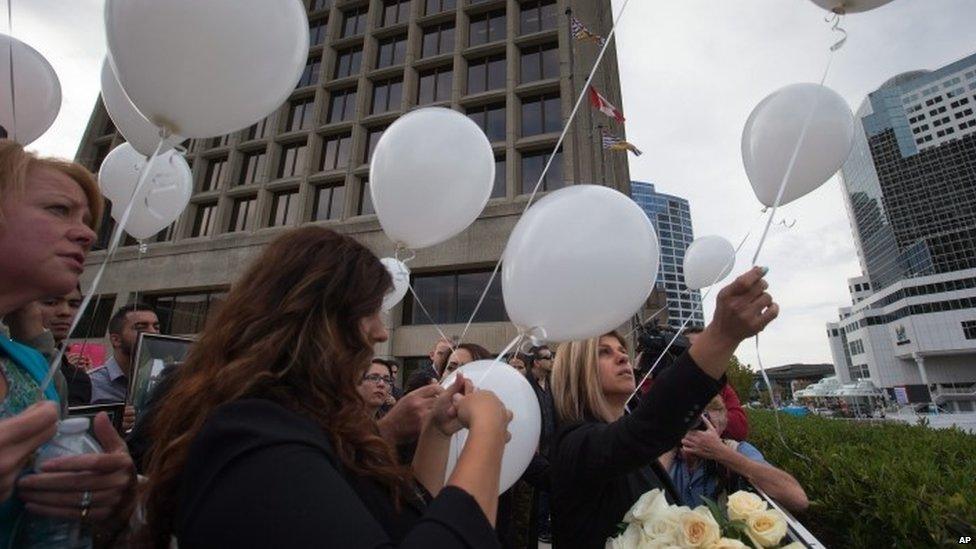Migrant crisis: Activist convoy drives to Hungary
- Published
Austrian activist Angelika: "Politics has failed so we have to do something"
A convoy of cars driven by German and Austrian activists has crossed into Hungary to pick up migrants and help them reach western Europe.
Thousands - many of whom initially fled conflict in Syria - have made their way through Austria since Hungary removed restrictions on transit on Friday.
Buses and special trains have been taking them from the Hungarian border to Vienna and on to Germany.
The Pope said every Catholic parish in Europe should host a migrant family.
Speaking during the Angelus prayer, Pope Francis appealed for "every parish, every religious community, every monastery, every sanctuary in Europe" to take in a family.
The border area is strewn with discarded belongings, as the migrants move into Austria

The convoy taking migrants from Hungary to Austria is a private initiative
On Sunday a convoy of about 140 cars left Vienna for the Hungarian capital, Budapest, as part of a private initiative dubbed "refugeeconvoy", external
One of the Austrian activists taking part, Angelika Neuwirth, told the BBC that their aim was to take them back to shelters in Austrian capital.
"I think this is my duty. I'm a mum, I'm a woman from Austria and I can't close my eyes anymore," she said. "We are all human. No-one is illegal."
However, Hungarian police spokeswoman Viktoria Csiszer-Kovacs said anyone taking migrants across the border was breaking the law.
Last week four Austrian activists who tried to do so were arrested for people smuggling but later released.
However, in the latest move a number of activists were able to collect migrants in Hungary without being stopped by police.
Drone footage filmed on Friday and Saturday shows the number of migrants prepared to walk to Austria
In other developments:
German officials say 11,000 asylum seekers arrived in the country on Saturday, with another 10,000 expected on Sunday
114 migrants have been rescued from a fishing boat off Cyprus - Syrians bound for Greece
UK Chancellor of the Exchequer George Osborne said Britain "needs to do even more" to help Syrian refugees
David Miliband, a former British foreign minister who now heads the New York-based International Rescue Committee, urged the US to take in 65,000 Syrian refugees
After days of confrontation and chaos, Hungary opened its borders with Austria and bussed thousands of migrants to the frontier on Friday.
Many, frustrated at being prevented from boarding trains in Budapest, had begun to walk along a motorway towards Austria.
Many of the migrants had travelled north through the Balkans - Greece, Macedonia and Serbia - before arriving in Hungary.
Hundreds more crossed into southern Hungary from Serbia on Sunday, where they were taken to a processing centre.

Thousands more migrants arrived in Germany by train on Sunday
Locals have welcomed Latifah al-Dobah and her family to their new home in Germany, as Murad Shishani reports
Germany, Austria, and Hungary have said the decision to allow migrants through is aimed at averting a humanitarian crisis, and will not set a precedent.
"Now, step by step, we must move away from emergency measures to lawful and humane normality," Austrian Chancellor Werner Faymann reaffirmed on Sunday.
EU rules requiring refugees to apply for asylum in the first country they land in "are still valid", a German government spokesman said.
However, in August Germany waived the rule on asylum seekers from Syria, allowing them to register in Germany regardless of where they first entered the EU.
Germany expects to take in 800,000 people this year. Syrians are the largest group travelling, followed by Afghans and Eritreans.


At the scene: Matthew Price, BBC News




There is little sign of a co-ordinated EU response to the crisis, despite more than 350,000 migrants having crossed the EU's borders in 2015 alone.
Germany, backed by the European Commission, has been pushing for a quota system for sharing out newcomers between EU member states.
But this has been opposed by several eastern members.
On Saturday, Hungary said that while it had temporarily relaxed restrictions on the transit of asylum seekers, it was pressing ahead with plans to tighten border controls and could send troops to its southern frontier if parliament agreed.
A border fence is due to completed by 15 September.

Migrant boy remembered

White balloons were released in the memory of Alan and Ghalib
A memorial has been held in Vancouver, Canada for three-year-old Alan Kurdi, his brother Ghalib and mother Rehanna, who drowned trying to reach the Greek island of Kos. The three have family in Canada.
Pictures of Alan's body, washed up on a Turkish beach, prompted widespread anguish.
Members of the Kurdi family were joined by more than 100 people to remember the three Syrians, who died on the journey to Europe after fleeing the conflict in their home country. Canada had earlier rejected an asylum application on behalf of the family.
Tima Kurdi, the boys' aunt, said she was worried about their father Abdullah, who attended the burial for his family in Syria on Friday.
"He's not leaving the graves. He was sleeping the last three days there, on the ground, beside them."

A note on terminology: The BBC uses the term migrant to refer to all people on the move who have yet to complete the legal process of claiming asylum. This group includes people fleeing war-torn countries such as Syria, who are likely to be granted refugee status, as well as people who are seeking jobs and better lives, who governments are likely to rule are economic migrants.

Are you among those trying to reach Austria and Germany? Have you been involved in these events? Email haveyoursay@bbc.co.uk, external with your experience.
Please include a contact number if you are willing to speak to a BBC journalist. You can also contact us in the following ways:
Whatsapp: +44 7525 900971
Send pictures/video to yourpics@bbc.co.uk, external
Tweet: @BBC_HaveYourSay, external
Send an SMS or MMS to 61124 or +44 7624 800 100